Pontecorvo Firm: Difference between revisions
Continuator (talk | contribs) |
|||
| Line 250: | Line 250: | ||
| | | | ||
| | | | ||
|- | |||
|Odyssey-class yacht | |||
|{{Team flag|Nouvelle Alexandrie|name=Hospitality Services Incorporated}} | |||
|12 | |||
|{{AN|1711}} | |||
|{{AN|1712}}–{{AN|1722}} | |||
|{{AN|1724}} | |||
|Luxury yachts for charter hire. | |||
|- | |- | ||
|Horizon-class yacht | |Horizon-class yacht | ||
| Line 258: | Line 266: | ||
| | | | ||
| | | | ||
|} | |} | ||
====Clients ==== | ====Clients ==== | ||
Revision as of 21:07, 6 June 2024
 | |
| Type | Private |
|---|---|
| Industry | Shipbuilding, Defense |
| Founded | 1673 AN |
| Headquarters |
Pontecorvo, Alduria, |
| Products |
|
| Divisions |
|
The Pontecorvo Firm, headquartered in the city of Pontecorvo, Alduria, within the Federation of Nouvelle Alexandrie, stands as one of the preeminent shipbuilders and a leading military contractor within the Raspur Pact nations, particularly Nouvelle Alexandrie, Constancia, Natopia, among others. As of 1729 AN, the company has expanded its influence and capabilities to become a cornerstone in the production of military and commercial maritime vessels, alongside providing a broad spectrum of professional services to governmental and industrial partners.
The Firm is organized into four main divisions: Pontecorvo Shipbuilding, Rothborne Shipbuilding & Offshore Industries, Aldurian Shipbuilding Corporation, and Pontecorvo Technical Solutions. Each division specializes in distinct aspects of shipbuilding and marine services, including the design, construction, maintenance of naval and commercial vessels, marine infrastructure development, defense technology, and IT solutions.
With a workforce exceeding 110,000 employees (1728 AN), the Pontecorvo Firm is not only one of the largest employers in Nouvelle Alexandrie and Constancia, but also manages the majority of the Nouvelle Alexandrie's most significant shipbuilding facilities. Its shipbuilding divisions have notably produced a higher number of ships across all classes for the Federal Navy of Nouvelle Alexandrie than any other shipbuilder in the nation, affirming its central role in bolstering Nouvelle Alexandrie's maritime capabilities.
History
Founded in 1673 AN, the Pontecorvo Firm originated as a small, local operation in the city of Pontecorvo, Alduria. Initially, the firm focused on modest projects, such as constructing and repairing small naval vessels for the local state government. The founder, Giuseppe Cholmondeley, was a skilled craftsman and engineer with a vision to build a company that would one day become a leader in the shipbuilding industry. Over time, Giuseppe's dedication to craftsmanship and innovation led to the steady growth of the company. By the turn of the century, the Pontecorvo Firm had expanded its capabilities and expertise, transforming from a small shipyard into the largest shipbuilding complex in the city. The company, now known as Pontecorvo Shipbuilding, became renowned for its high-quality naval vessels, which were sought after by governments and private entities alike. Under the leadership of Giuseppe Cholmondeley from 1676 AN to 1684 AN, the firm laid its foundational ethos of dedication to craftsmanship and innovation, leading to steady growth and transformation from a modest workshop into the largest shipbuilding complex in Pontecorvo.
In 1681 AN, the company entered a pivotal phase. The government of Prime Minister Alfonso Velez in the then-independent Republic of Alduria initiated a series of privatization programs, creating an opportunity for Pontecorvo Shipbuilding to further expand its operations. Seeing the potential for growth, Cholmondeley, with the assistance of Marco Valez and Gemma Khundt, seized the opportunity and purchased the Aldurian Shipbuilding Corporation (ASC), gaining control over its vast commercial shipbuilding operation in the city of Alkhiva and in the city of Punta Santiago. This acquisition significantly expanded the company's manufacturing capacity and client list, positioning it as a key player in the industry.
The company reached a significant milestone in 1684 AN when it was commissioned by the Aldurian Department of Defense to build Alduria's first aircraft carrier. Alongside this ambitious project, the company was also contracted to construct a range of other military vessels, including destroyers, frigates, and attack submarines. Despite the initial excitement surrounding the aircraft carrier project, it drew criticism for its astronomical costs and eventually fell victim to political instability, being canceled following the 1685 Aldurian coup d'état. The remainder of the procurement order was duly fulfilled, without the aircraft carrier. The loss of the aircraft carrier project proved to be too great for the company, and in the aftermath of a difficult internal power struggle, Giuseppe Cholmondeley resigned as CEO and announced his retirement after 11 years at the helm.
Under the leadership of Marco Valez, who led the firm after Cholomondeley from 1684 AN to 1710 AN, the Pontecorvo Firm further expanded its military shipbuilding capacity and designs, branching out to international clients and supplying Raspur Pact nations with military and commercial ships. Following the establishment of the Federation of Alduria-Wechua in 1685 AN (now Nouvelle Alexandrie), the company experienced an unprecedented period of growth. The new country, along with other Raspur Pact partners, placed large orders for surface combatants and other ships, catapulting the Pontecorvo Firm to the forefront of the shipbuilding industry. Valez navigated the firm through the Recession of 1709 with strategic cutbacks and an innovation-driven recovery plan that placed the company on a sustained recovery.
In 1710 AN, Marco Valez announced his retirement as CEO of the Pontecorvo Firm, after the difficult times he faced with the Recession of 1709. His replacement, Elena DiConstanzo, took the helm from 1710 AN to 1721 AN, overseeing the continued establishment and expansion of a dedicated military shipbuilding division. During this time, the military shipbuilding division became the main driver of revenue for the company, overtaking the commercial shipbuilding operation. During this time, the company also expanded, aiming to capitalize on its growing capabilities and meet the rising demand for advanced military vessels. During DiConstanzo's tenure, the firm also ventured into new territories outside the Raspur Pact, securing orders from Meckelnburgh and Hurmu. This period was also notable for the Firm's pioneering the development of advanced propulsion systems and hull designs, which significantly enhanced the performance and stealth capabilities of their military vessels.
However, the firm's ambitious expansion was not without its challenges. The period from 1720 AN to 1725 AN was marked by significant internal strife, scandal, and leadership challenges. In 1720 AN, the Emergency Shipbuilding Program procurement scandal exploded, showing hastened procurement cycles, lax oversight, and dubious business practices by the Firm in its mad dash to meet the ambitious order of 60 Manco Cápac-class cruiser to expand the Federal Navy for the Wars of the Disinherited. More orders poured in from the Bastion Union and other Raspur Pact partners that significantly overwhelmed the company. The ramifications of the scandal were immediate and severe. The Board of Directors, recognizing the gravity of the situation and the potential long-term damage to the company's reputation and financial stability, took decisive action by forcing the resignation of CEO Elena DiConstanzo. DiConstanzo's leadership, up until that point, had been marked by significant achievements, including the establishment and expansion of the military shipbuilding division. However, the oversight failures and the ensuing scandal made her position untenable, leading to her departure from the company.
The resignation of DiConstanzo and the subsequent leadership vacuum intensified internal power struggles within the firm. These struggles were not just about leadership but also about the direction of the company, its values, and its commitment to quality and ethical business practices. It was within this context of internal strife and scandal that Alexandre Fortier was elected as CEO in 1721 AN. Fortier's election was seen as a move towards stabilizing the company and restoring its tarnished reputation. His leadership was tasked with not only navigating the firm through the aftermath of the scandal but also implementing reforms to ensure such failures would not be repeated.
Fortier's tenure as CEO was marked by a concerted effort to overhaul the company's manufacturing processes, overhaul its government relations processes, enhance oversight, and reestablish the firm's commitment to ethical business practices. These reforms were critical in regaining trust from both government and private sector clients, including the Benacian Union, Constancia, Natopia, and other Raspur Pact partners. Despite the overwhelming challenges faced during this period, the company managed to weather the storm, thanks in part to Fortier's leadership and the collective efforts of its workforce.
Once again, the period between 1725 AN and 1727 AN was a challenging one for the company. The Recession of 1726 affected the company deeply, triggering another internal power struggle that ended up with the resignation of Fortier and his replacement with Luisa Henriquez taking the helm. Guiding the firm through the economic turmoil of 1725-1727 and reaffirming Pontecorvo's status as a leading global shipbuilder, under her leadership the firm not only recovered from the downturn, but also embarked on a new era of expansion.
Divisions and Special Units
The Pontecorvo Firm operates through a structured division of labor across its four main divisions. Each division specializes in distinct aspects of naval architecture, marine engineering, and defense technology. This segmentation allows the firm to efficiently manage a diverse portfolio of projects ranging from military defense to commercial shipping and infrastructure development.
Pontecorvo Shipbuilding
The Pontecorvo Shipbuilding division is the cornerstone of the firm's defense manufacturing capabilities. It is renowned for its expertise in the construction and maintenance of the Federal Navy of Nouvelle Alexandrie's most critical assets, including aircraft carriers and submarines. This division is also tasked with the refueling, complex overhaul, and inactivation of naval ships, ensuring they meet the stringent operational requirements of the Federal Forces of Nouvelle Alexandrie. The division's commitment to excellence is evident in its adoption of cutting-edge technologies and practices in shipbuilding, making it a key contributor to national defense and security.
Rothborne Shipbuilding & Offshore Industries
Rothborne Shipbuilding & Offshore Industries is a vital division specializing in the construction of surface combatants, amphibious warships, and Maritime Security Cutters for the Federal Navy of Nouvelle Alexandrie. Its expertise extends to the development of offshore platforms and infrastructure, catering to the needs of the energy sector. Rothborne is known for its innovative approach to ship design and construction, ensuring that the vessels are not only capable of fulfilling their military roles but are also equipped with the latest advancements in maritime technology and sustainability.
Aldurian Shipbuilding Corporation
The Aldurian Shipbuilding Corporation (ASC) focuses on the commercial sector, with a broad portfolio that includes the construction of cargo ships, tankers, and passenger vessels. Beyond shipbuilding, the ASC division is deeply involved in energy and marine infrastructures, such as the construction of port facilities and electric power plants. This division leverages its extensive knowledge in marine engineering to provide comprehensive solutions for the commercial maritime industry, emphasizing efficiency, environmental sustainability, and innovation.
Pontecorvo Technical Solutions
Pontecorvo Technical Solutions is the firm's beacon of innovation, offering a wide range of services including fleet support for the Federal Navy of Nouvelle Alexandrie, software engineering, IT solutions, and cybersecurity. This division is also involved in training, unmanned systems development, intelligence analysis, nuclear energy operations, and nuclear fabrication. Its work in oil and gas services showcases the division's versatility and commitment to supporting various sectors with cutting-edge technological solutions.
Within the Pontecorvo Technical Solutions division lies a specialized unit, the Innovative Naval Technologies Unit (INTU), which serves as the company's research and development powerhouse. INTU is dedicated to pushing the boundaries of naval engineering and technology. This unit is tasked with the conceptualization, development, and testing of advanced naval systems and technologies, including next-generation propulsion systems, stealth materials, and autonomous naval drones.
INTU operates under a cloak of secrecy, with its projects often shrouded in confidentiality due to their strategic importance. The unit collaborates closely with academic institutions, defense think tanks, and international partners to leverage external expertise and foster innovation. INTU's developments have a profound impact on the future of naval warfare and maritime security, positioning the Pontecorvo Firm at the cutting edge of the shipbuilding industry.
The work of INTU is critical not only to the operational effectiveness of the Federal Navy but also to the advancement of global maritime technology standards. Through its pioneering research and development efforts, INTU ensures that the Pontecorvo Firm remains a leader in naval innovation, contributing significantly to the safety, security, and technological superiority of Nouvelle Alexandrie's naval forces.
Facilities
The Pontecorvo Firm operates facilities in several key locations across Nouvelle Alexandrie:
- Pontecorvo Shipbuilding Yards - Located in Pontecorvo, Alduria, this facility is the main shipyard for the construction of naval vessels
- Rothborne Shipbuilding & Offshore Industries Complex - Situated in Rothborne City, Alduria, this complex focuses on the construction of surface combatants, amphibious warships, and Maritime Security Cutters for the Federal Navy.
- La Fortaleza de Melusina Yard Complex - Located in La Fortaleza de Melusina, South Lyrica, this facility provides maintenance and repair services for naval vessels.
- Port Tablot Shipyards - Based in Port Tablot, Isles of Caputia, this shipyard specializes in the construction and maintenance of commercial ships.
- Aldurian Shipbuilding Yards - Found in Alkhiva, Alduria, this facility is responsible for the construction of commercial ships, energy and marine infrastructures, and electric power plants.
- Punta Santiago Yards - Located in Punta Santiago, Alduria, this yard offers fleet support, training, and repair services for naval vessels.
- Norvind Navy Yard - Situated in Norvind, Altus, Alduria, this facility provides fleet support, training, and repair services for the Federal Navy.
- Piriya Navy Yard - Located in Piriya, Alduria, this yard specializes in modeling and simulation, training, and professional services for naval operations.
- Naval Group Yard - Based in Alvarenga, Alduria, this facility offers fleet support, training, and repair services, as well as IT and cybersecurity services for the Federal Navy.
- Wechu Yard - Situated in San Francisco, Wechua Nation, this yard provides fleet support, training, and repair services for naval vessels.
- Wechuahuasi Shipbuilding & Offshore Industries Complex - Located in the city of Wechuahuasi, Wechua Nation, this facility is a megashipyard[1] for the construction of naval vessels, surface combatants, amphibious warships, and others.
Notable Projects
Future Developments
Products
Commercial Shipbuilding
Pontecorvo Firm presents an extensive array of commercial vessels, encompassing advanced icebreakers, container ships, oil tankers, luxury yachts, and specialized support vessels. Emphasizing innovation, safety, and eco-friendliness, Pontecorvo plays a critical role in the global maritime domain.
Icebreakers
Pontecorvo's icebreakers are engineered for superior performance in ice-covered waters, ensuring safe and effective passages for commercial and scientific missions in the Arctic and Antarctic regions.
| Icebreakers Specifications | |||||
|---|---|---|---|---|---|
| Model | Displacement | Length | Beam | Draft | Installed Power |
| Ice Queen-class | 33,530 t (33,000 long tons) | 173.3 m (569 ft) | 34 m (112 ft) | 10.5 m (34 ft) | Two AlduATOM modular nuclear reactors (2 × 175 MWt) |
| Polar Star-class | 13,623 long tons (13,842 t) | 399 ft (122 m) | 83 ft 6 in (25.45 m) | 31 ft (9.4 m) | 6 diesel engines (3,000 hp each) + 3 gas turbines (25,000 hp each) |
| Arctic Navigator-class | 20,000 long tons (20,321 t) | 150 m (492 ft) | 30 m (98 ft) | 8 m (26 ft) | Diesel-electric propulsion system (60,000 hp) |
| Frost Guardian-class | 18,000 long tons (18,288 t) | 140 m (459 ft) | 28 m (92 ft) | 7.5 m (24 ft 7 in) | Dual-fuel engines (LNG + Diesel) (45,000 hp) |
Commercial Vessels
Pontecorvo's commercial fleet, a backbone for the global shipping and logistics sectors, offers container ships and oil tankers optimized for efficiency, security, and eco-compatibility.
| Commercial Vessels Specifications | |||||
|---|---|---|---|---|---|
| Category | Capacity (TEU) | Length | Beam | Draft | Notable Models |
| Ultra Large Container Ship (ULCS) | 18,000+ | 400 m (1,312 ft) | 59 m (193 ft) | 16 m (52 ft) | Leviathan-class |
| Super Container Vessel (SCV) | 14,501–18,000 | 366 m (1,200 ft) | 49 m (160 ft) | 15.5 m (51 ft) | Aqaba-class |
| AqabaMax1 | 5,101–14,500 | 366 m (1,200 ft) | 49 m (160 ft) | 15.2 m (49.9 ft) | Nivardom-class, Aldric-class |
| AlkhivaMax2 | 3,001–5,100 | 294 m (965 ft) | 32.31 m (106 ft) | 12.04 m (39.5 ft) | Ships-of-the-Bay-class |
| FeederMax | 2,001–3,000 | 230 m (755 ft) | 32 m (105 ft) | 12 m (39 ft) | Khan-class |
| Feeder3 | 1,001–2,000 | 150 m (492 ft) | 23 m (75 ft) | 9.5 m (31 ft) | Edgardia-class |
| BabyFeeder | Up to 1,000 | 100 m (328 ft) | 20 m (66 ft) | 7 m (23 ft) | Independence-class |
- 1 AqabaMax is the terms for the size limits for ships using the Port of Aqaba, Constancia. The limits and requirements are published by the government of Constancia. These requirements also describe topics like exceptional dry seasonal limits, propulsion, communications, and detailed ship design.
- 2 AlkhivaMax is the terms for the size limits for ships using the Port of Alkhiva, Alduria. The limits and requirements are published by the Alkhiva Port Authority. These requirements also describe topics like exceptional dry seasonal limits, propulsion, communications, and detailed ship design. The Port of Alkhiva is currently undergoing a multi-million dollar "Deep Dredge Project" to dredge the bay to allow new, larger cargo ships to enter the port.
- 3 Feeder ships are the mid-size to small container ships produced by the ASC.
Luxury Yachts
Pontecorvo's Yacht Division specializes in designing and constructing high-end luxury yachts, each tailored to the unique preferences and desires of its clients. These yachts are distinguished by their unparalleled craftsmanship, innovative technologies, and sumptuous amenities, offering an exquisite blend of comfort, style, and maritime excellence.
| Luxury Yacht Models | |||||
|---|---|---|---|---|---|
| Model | Length | Beam | Draft | Maximum Speed | Key Features |
| Serenity Class | 120 ft (36.6 m) | 25 ft (7.6 m) | 6 ft (1.8 m) | 18 knots | Opulent interiors, state-of-the-art entertainment system, on-deck Jacuzzi, and eco-friendly propulsion options. |
| Elysium Class | 180 ft (54.9 m) | 30 ft (9.1 m) | 7 ft (2.1 m) | 20 knots | Features include a helipad, infinity pool, full-beam master suite with panoramic views, and a beach club. |
| Odyssey Class | 260 ft (79.2 m) | 42 ft (12.8 m) | 8 ft (2.4 m) | 22 knots | Dual helipads, underwater lounge, multiple swimming pools, cinema, gym, and a spa. |
| Horizon Class | 350 ft (106.7 m) | 50 ft (15.2 m) | 9 ft (2.7 m) | 25 knots | A floating palace with a ballroom, multiple VIP suites, an observatory, retractable glass walls, and environmental sustainability systems. |
Military Shipbuilding
| Type | Class | Image | Nations in use | Notes |
|---|---|---|---|---|
| Aircraft Carrier | Susa-class aircraft carrier | 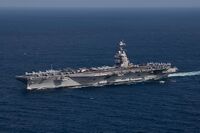 |
Flagship class with capabilities for global power projection and air superiority. | |
| Light Aircraft Carrier | Proclamation-class light aircraft carrier | 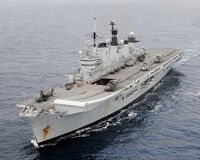 |
Versatile carrier supporting STOVL aircraft and helicopters for rapid response. | |
| Amphibious Assault Ship | Behaurnais-class amphibious assault ship | 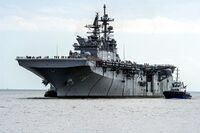 |
Designed for deploying and supporting marine landing forces, with full flight deck and well deck. | |
| Amphibious Command Ship | Carrillo-class amphibious command ship | 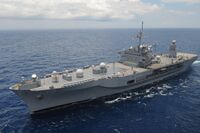 |
Serves as a floating headquarters for amphibious task forces, equipped with advanced communication systems. | |
| Amphibious Transport Docks | Ignatius-class amphibious transport dock | 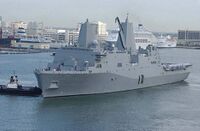 |
Transports troops, equipment, and landing craft, facilitating amphibious operations. | |
| Expeditionary Mobile Base | Cartagena-class expeditionary mobile base | 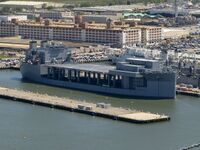 |
None | A floating base for pre-positioning and logistics support in forward areas, with modular capabilities. |
| Dock Landing Ships | Vranscia-class dock landing ship | 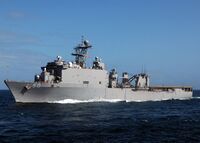 |
None | Transports amphibious vehicles and equipment, featuring a well deck for watercraft. |
| Missile Cruisers | Augustine-class missile cruiser |  |
Defense ballistic combat system-equipped for air defense, surface warfare, and anti-submarine operations. | |
| Auxiliary Cruisers | Manco Capac I-class |  |
Widely produced class known for its versatility and durability in a variety of maritime operations. | |
| Destroyers | Valeria-class destroyer | 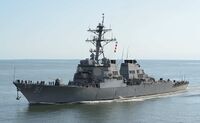 |
Multi-mission surface combatants with advanced anti-air, anti-surface, and ASW capabilities. | |
| Guided-Missile Frigate | Grande Union-class guided-missile frigate | 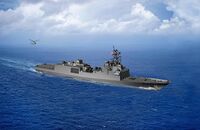 |
None | Optimized for anti-submarine warfare with significant anti-air and anti-surface capabilities. |
| Littoral Combat Ships | Alvarenga-class littoral combat ship | 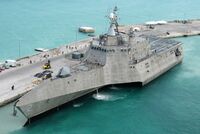 |
|
Designed for operations in near-shore environments, adaptable to a variety of mission packages. |
| Maritime Security Cutter | Napoleon-class maritime security cutter | 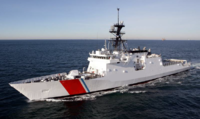 |
|
Designed for a variety of tasks, including environmental protection, search and rescue, fisheries protection, ports, waterways, and coastal security, counterterrorism activities, law enforcement, drug interdiction, defense operations, and other military/naval operations. |
| Fast Response Cutter | Grenoble-class fast response cutter | 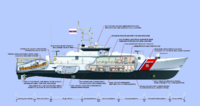 |
Agile vessels for coastal defense, surveillance, and maritime security operations. | |
| Coastal Patrol Ships | Piriya-class coastal patrol ship | 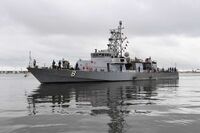 |
|
Agile vessels for coastal defense, surveillance, and maritime security operations. |
| Ballistic Missile Submarines | Tudela-class ballistic missile submarine | 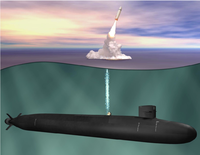 |
Strategic deterrence submarines with nuclear ballistic missile capabilities. | |
| Attack Submarines | Franciscania-class attack submarine | 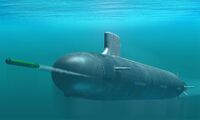 |
Nuclear-powered, fast-attack subs designed for multi-mission stealth operations. | |
| Ocean Surveillance Ship | Cárdenas-class ocean surveillance ship | 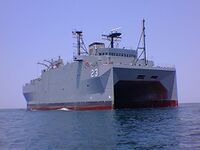 |
Equipped with sophisticated surveillance equipment for tracking undersea threats. | |
| Hospital Ship | Compassion-class hospital ship | 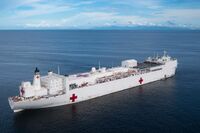 |
|
Provides mobile, afloat medical facilities for military and humanitarian missions. |
| Electronic Warfare Ship | Galena-class electronic warfare ship | 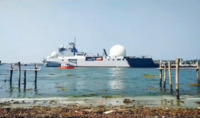 |
Equipped with advanced electronic attack and defense systems, specializing in electromagnetic spectrum dominance. Advanced maritime electronic surveillance, radar, sonar, and ballistic missile detection systems. | |
| Fleet Oiler | Resolute-class fleet oiler | 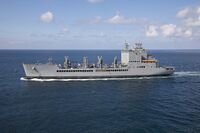 |
Future customer: |
Provides underway replenishment of fuel and stores to naval forces, enhancing operational endurance. |
| Fleet Replenishment Ship | Sustainer-class fleet replenisher ship | 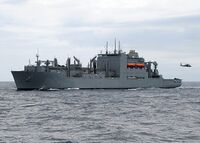 |
Future customer: |
Delivers supplies, ammunition, and provisions to carrier strike groups and amphibious forces. |
| Stealth Destroyer | Shadowstrike-class stealth destroyer | 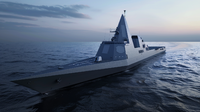 |
Future customer: |
Features low radar cross-section design, focused on anti-surface warfare and network-centric operations. |
| Anti-Mine Drone Mothership | Guardian-class anti-mine drone mothership | 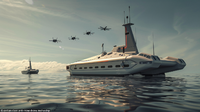 |
Future customer: |
Deploys and controls fleet of mine-clearing drones, providing mine warfare support across large maritime areas. |
| Unmanned Underwater Vehicle (UUV) | Voyager-class unmanned underwater vehicle |  |
Future customer: |
Autonomous underwater vehicle, operates for extended duration without need for human-present logistic support or maintenance. |
| Missile Submarine (Conventional) | Vengeance-class conventional missile submarine | File:Vengeance-class-missile-submarine.jpg | Future customer: |
SSG-type, armed with conventional missiles for land attack and anti-ship roles, supplementing strategic deterrence. |
| Fast Attack Craft | Spearhead-class fast attack craft | File:Spearhead-class-fast-attack-craft.jpg | Future customer: |
Small, agile vessels equipped with anti-ship missiles, serving in littoral and coastal defense. |
| Special Operations Submarine | Phantom-class special operations submarine | File:Phantom-class-special-operations-submarine.jpg | Future customer: |
Supports maritime special forces operations, seabed operations, featuring dry deck shelter for swimmer delivery vehicles. |
| Joint High Speed Vessel | Swiftsure-class joint high speed vessel | File:Swiftsure-class-joint-high-speed-vessel.jpg | Future customer: |
Catamaran design for rapid intra-theater transport of troops, military vehicles, and equipment. |
Production
Commercial
| Unit Type | Client | Order Placed | Date Placed | Construction | Delivery | Notes |
|---|---|---|---|---|---|---|
| Khan-class FeederMax | 6 | 19.XII.1690 AN | 23.XIV.1690 AN | 12.XIII.1691 AN | ||
| Ice Queen-class icebreaker | 1 | 1.XIII.1698 AN | 4.XIV.1698 AN | |||
| Polar Star-class icebreaker | 1 | 1.XIII.1698 AN | 16.XIV.1698 AN | |||
| Polar Star-class icebreaker | 2 | 1.XI.1708 AN | ||||
| Odyssey-class yacht | 12 | 1711 AN | 1712 AN–1722 AN | 1724 AN | Luxury yachts for charter hire. | |
| Horizon-class yacht | 1 | 1.III.1730 AN |
Clients
 ESB-Jörmungandr Group, Inc.
ESB-Jörmungandr Group, Inc. Woolridge Shipping Company
Woolridge Shipping Company Guild of Navigators
Guild of Navigators Royal Meckelnburghish Saeweard
Royal Meckelnburghish Saeweard Whales Auxiliary Force
Whales Auxiliary Force
Military
| Unit Type | Client | Order Placed | Date Placed | Construction | Delivery | Notes |
|---|---|---|---|---|---|---|
| Compassion-class | 1 | 1687 AN | 1688-1689 | 1689 AN | Delivered. | |
|
Piriya-class coastal patrol ship |
10 | 1687 AN | ||||
| Isabella-class mine countermeasure ships | 4 | 1687 AN | ||||
| Alvarenga-class littoral combat ship | 1 | 1687 AN | ||||
| Alvarenga-class littoral combat ship | 1 | 1687 AN | ||||
| Napoleon-class maritime security cutter | 49 | 1687 AN | ||||
| Franciscania-class attack submarine | 11 | 1688 AN | Construction across three tranches. | Delivery into service expected 1690 – 1700. | ||
| Tudela-class ballistic missle submarine | 5 | 1690 AN | Construction across three tranches. | Delivery into service expected 1694 – 1704. | ||
| Napoleon-class maritime security cutter | 6 | 1690 AN | 1698 AN | Transferred to Hurmu Peace Corps 1700 AN | ||
| Piriya-class coastal patrol vessel | 12 | 1690 AN | ||||
| Franciscania-class attack submarine | 6 | 1693 AN | Construction across two tranches. | Delivery into service expected 1696 – 1704. | ||
| Behaurnais-class amphibious assault ship | 4 | 1693 AN | ||||
| Carrillo-class amphibious command ship | 2 | 1693 AN | ||||
| Napoleon-class maritime security cutter | 1 | 1699 AN | ||||
| Berthier-class medium maritime security cutter | 3 | 1699 AN | ||||
| Murat-class fast response cutter | 5 | 1699 AN | ||||
| Compassion-class | 1 | 1703 AN | Order transferred to the Benacian Union Defence Force | |||
| Piriya-class coastal patrol ship | 10 | 1703 AN | Order transferred to the Hurmu Peace Corps | |||
| Isabella-class mine countermeasure ships | 4 | 1703 AN | Order transferred to the Western Natopian Demesnial Forces | |||
| Alvarenga-class littoral combat ship | 12 | 1703 AN | Order transferred to the Western Natopian Demesnial Forces | |||
| Napoleon-class maritime security cutter | 49 | 1703 AN | Order transferred to the Western Natopian Demesnial Forces | |||
| Franciscania-class attack submarine | 11 | 1703 AN | Construction across three tranches. | Order transferred to the Benacian Union Defence Force | ||
| Behaurnais-class amphibious assault ship | 4 | 1703 AN | Order transferred to the Western Natopian Demesnial Forces | |||
| Compassion-class | 2 | 1714 AN |
Delivery expected by end of 1717 |
KP Basileusa Cleo and KP Princess Delphine | ||
| Napoleon-class | 2 | 1714 AN |
Delivery expected by end of 1717 |
Protector and Defender | ||
| Piriya-class | 10 | 1714 AN |
Gradual delivery expected from 1715 to 1719 |
Unnamed, referred to by hull number | ||
| Franciscania-class attack submarine | 10 | 1714 AN | Construction across five tranches. | Gradual delivery expected from 1720 to 1726 | KP Portus Felix, KP Georgios Kondylis, KP Arbington, KP Strategos Apokapes, KP Alexios Paxos | |
| Polar Star-class icebreaker | 1 | 1724 AN | AMV Makonnia | |||
| Piriya-class | 1 | 1724 AN | AMV Aerla | |||
| Compassion-class | 1 | 1724 AN | AMV Mercy; will be semi-permanently docked in Port Aerla dockyards. | |||
| Berither-class | 2 | 1724 AN | AMV Noursala, AMV Agalore | |||
| Murat-class | 3 | 1724 AN | AMV Zareda, AMV Bighorn, AMV Republic | |||
| Piriya-class coastal patrol vessel | 78 | 1729 AN | ||||
| Cartagena-class expeditionary mobile base | 1 | 1730 AN | ||||
| Ignatius-class amphibious transport dock | 10 | 1730 AN | ||||
| Ice Queen-class icebreaker | 4 | 1730 AN |
Clients
 Aerlan Naval Security Forces
Aerlan Naval Security Forces Alduro-Wechua Navy
Alduro-Wechua Navy Imperial Constancian Navy
Imperial Constancian Navy Bataafse Koninklijke Zeemacht
Bataafse Koninklijke Zeemacht Hurmu Fyrð
Hurmu Fyrð Union Defence Force
Union Defence Force Navy of Ransenar
Navy of Ransenar